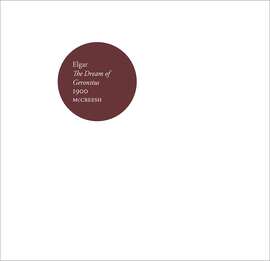Elgars riesiges Chorwerk The Dream of Gerontius behandelt, ohne jetzt ein wirkliches Requiem zu sein, die Themen Tod, Erlösung und Auferstehung. Er orientiert sich dabei, und das war neu, nicht an den Oratorien eines Händel oder Mendelssohn, sondern eher an den Musikdramen eines Richard Wagner. Somit verwundert es auch nicht, wenn manchmal Ähnlichkeiten mit dessen Parsifal zu hören sind.
Paul McCreesh, der englische Barockspezialist hat sich nun dieses Werkes angenommen und interpretiert es mit riesigem Orchester und großem Choraufgebot. McCreesh versucht, genau das Instrumentarium aufzubieten, das Elgar 1900 zur Verfügung hatte. Das tut der Musik von Elgar sehr gut, weil sie weniger schwülstig und pathetisch, somit frischer und griffiger klingt, als man das hätte vermuten können. Dank der großen Besetzung erlebt der Hörer ein wahres Klangspektakel, das aber dank McCreeshs Können sehr kontrolliert und übersichtig wirkt, ohne dabei an Wirkung einzubüßen.
Die Gabrieli Singers werden durch Gabrieli Roar und den Polish National Youth Choir unterstützt und finden unter McCreeshs Gesamtleitung zu einer wunderbaren Einheit und Harmonie zusammen. Auch die drei Solistenpartien sind mit Andrew Foster-Williams, Nicky Spence und Anna Stéphany hervorragend besetzt.
Diese Einspielung ist dank ihrer hervorragenden Aufnahmetechnik und der beeindruckenden Interpretation aller Mitwirkenden ein absoluter Gewinn für die Elgar-Diskographie. Paul McCreesh ist zweifellos eine Referenzeinspielung von The Dream of Gerontius gelungen.
Elgar’s huge choral work The Dream of Gerontius deals with the themes of death, redemption and resurrection without being a real requiem. It is not rooted in the oratorios of Handel or Mendelssohn, but rather in the music dramas of Richard Wagner, which was new at the time of its composition. It is therefore not surprising that similarities with Wagner’s Parsifal can sometimes be heard.
Paul McCreesh, the English baroque specialist, has now taken on this work and interprets it with a huge orchestra and a large choral ensemble. McCreesh attempts to use exactly the ensemble that Elgar had at his disposal in 1900. This is very good for Elgar’s music, because it sounds less pompous and pathetic and therefore fresher and catchier than one might have expected. Thanks to the large orchestra, the listener experiences a true spectacle of sound, which, thanks to McCreesh’s skill, is very controlled and clear without losing any of its impact.
The Gabrieli Singers are supported by Gabrieli Roar and the Polish National Youth Choir and come together in wonderful unity and harmony under McCreesh’s overall direction. The three soloist roles are also excellently cast in all respects with Andrew Foster-Williams, Nicky Spence and Anna Stéphany.
This recording is an absolute asset to the Elgar discography thanks to its outstanding recording technique and the impressive interpretation of all the performers. Paul McCreesh has clearly succeeded in making a reference recording of The Dream of Gerontius.




















